Contract Law: Offer and Acceptance Rules and Case Studies Analysis
VerifiedAdded on 2023/01/18
|11
|3789
|46
Report
AI Summary
This report delves into the intricacies of contract law, with a specific focus on the crucial elements of offer and acceptance. It begins by defining contracts and their legal implications, emphasizing the importance of these concepts in both business and personal contexts. The report then explores the essential components of a valid contract, with a detailed analysis of offer and acceptance, including rules of agreement, principles of offer and acceptance, and relevant case laws. Key concepts such as general and specific offers, the requirements for a valid offer, and the rules governing acceptance are thoroughly examined. The report also addresses the complexities of offer and acceptance, the evolution of related rules, and the significance of landmark cases like Fisher v. Bell and Harvey v. Facey. Through this comprehensive analysis, the report aims to provide a clear understanding of the legal principles governing contract formation and to highlight the importance of these principles in avoiding future disputes.

Contract Law
Paraphrase This Document
Need a fresh take? Get an instant paraphrase of this document with our AI Paraphraser

Contents
INTRODUCTION...........................................................................................................................3
MAIN BODY...................................................................................................................................3
REFERENCES................................................................................................................................9
INTRODUCTION...........................................................................................................................3
MAIN BODY...................................................................................................................................3
REFERENCES................................................................................................................................9
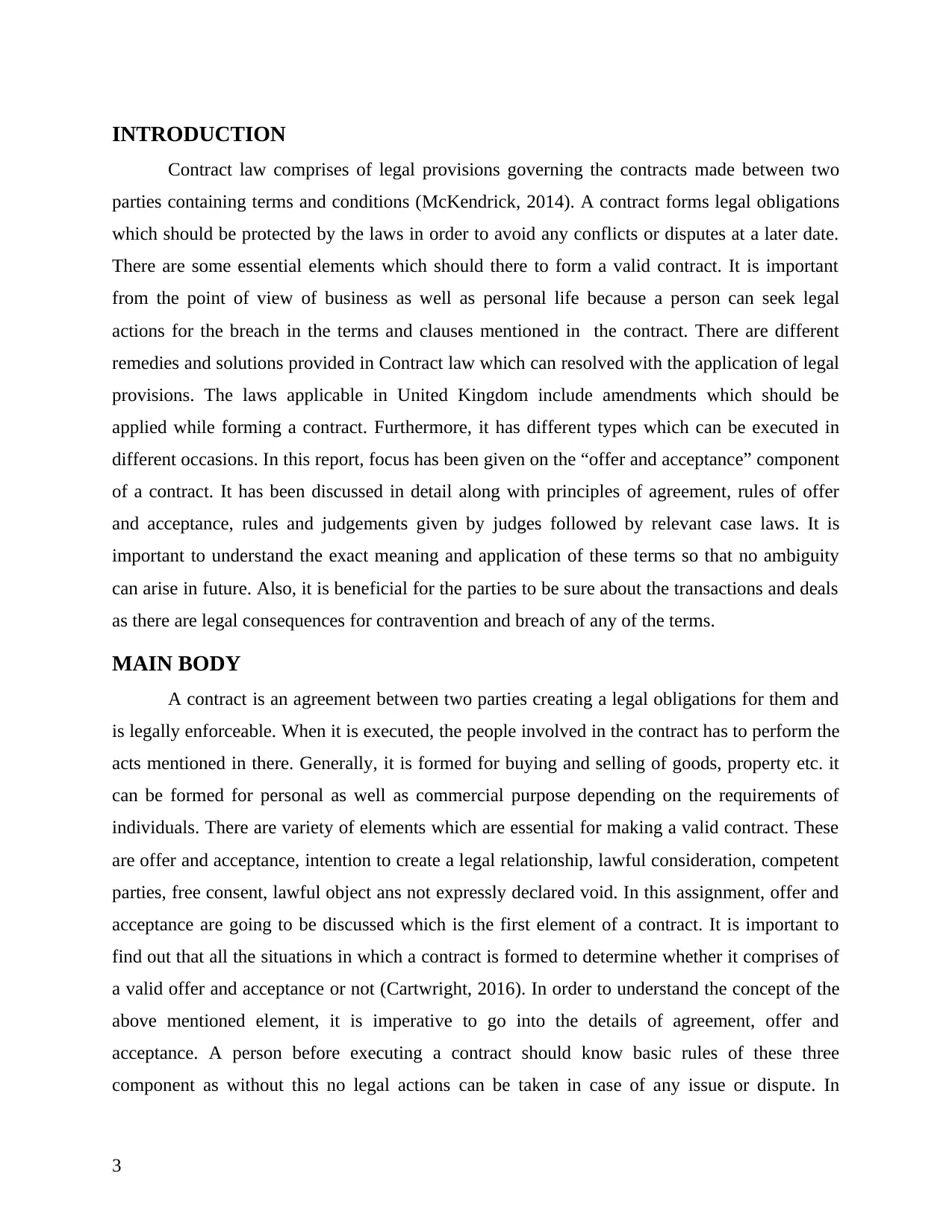
INTRODUCTION
Contract law comprises of legal provisions governing the contracts made between two
parties containing terms and conditions (McKendrick, 2014). A contract forms legal obligations
which should be protected by the laws in order to avoid any conflicts or disputes at a later date.
There are some essential elements which should there to form a valid contract. It is important
from the point of view of business as well as personal life because a person can seek legal
actions for the breach in the terms and clauses mentioned in the contract. There are different
remedies and solutions provided in Contract law which can resolved with the application of legal
provisions. The laws applicable in United Kingdom include amendments which should be
applied while forming a contract. Furthermore, it has different types which can be executed in
different occasions. In this report, focus has been given on the “offer and acceptance” component
of a contract. It has been discussed in detail along with principles of agreement, rules of offer
and acceptance, rules and judgements given by judges followed by relevant case laws. It is
important to understand the exact meaning and application of these terms so that no ambiguity
can arise in future. Also, it is beneficial for the parties to be sure about the transactions and deals
as there are legal consequences for contravention and breach of any of the terms.
MAIN BODY
A contract is an agreement between two parties creating a legal obligations for them and
is legally enforceable. When it is executed, the people involved in the contract has to perform the
acts mentioned in there. Generally, it is formed for buying and selling of goods, property etc. it
can be formed for personal as well as commercial purpose depending on the requirements of
individuals. There are variety of elements which are essential for making a valid contract. These
are offer and acceptance, intention to create a legal relationship, lawful consideration, competent
parties, free consent, lawful object ans not expressly declared void. In this assignment, offer and
acceptance are going to be discussed which is the first element of a contract. It is important to
find out that all the situations in which a contract is formed to determine whether it comprises of
a valid offer and acceptance or not (Cartwright, 2016). In order to understand the concept of the
above mentioned element, it is imperative to go into the details of agreement, offer and
acceptance. A person before executing a contract should know basic rules of these three
component as without this no legal actions can be taken in case of any issue or dispute. In
3
Contract law comprises of legal provisions governing the contracts made between two
parties containing terms and conditions (McKendrick, 2014). A contract forms legal obligations
which should be protected by the laws in order to avoid any conflicts or disputes at a later date.
There are some essential elements which should there to form a valid contract. It is important
from the point of view of business as well as personal life because a person can seek legal
actions for the breach in the terms and clauses mentioned in the contract. There are different
remedies and solutions provided in Contract law which can resolved with the application of legal
provisions. The laws applicable in United Kingdom include amendments which should be
applied while forming a contract. Furthermore, it has different types which can be executed in
different occasions. In this report, focus has been given on the “offer and acceptance” component
of a contract. It has been discussed in detail along with principles of agreement, rules of offer
and acceptance, rules and judgements given by judges followed by relevant case laws. It is
important to understand the exact meaning and application of these terms so that no ambiguity
can arise in future. Also, it is beneficial for the parties to be sure about the transactions and deals
as there are legal consequences for contravention and breach of any of the terms.
MAIN BODY
A contract is an agreement between two parties creating a legal obligations for them and
is legally enforceable. When it is executed, the people involved in the contract has to perform the
acts mentioned in there. Generally, it is formed for buying and selling of goods, property etc. it
can be formed for personal as well as commercial purpose depending on the requirements of
individuals. There are variety of elements which are essential for making a valid contract. These
are offer and acceptance, intention to create a legal relationship, lawful consideration, competent
parties, free consent, lawful object ans not expressly declared void. In this assignment, offer and
acceptance are going to be discussed which is the first element of a contract. It is important to
find out that all the situations in which a contract is formed to determine whether it comprises of
a valid offer and acceptance or not (Cartwright, 2016). In order to understand the concept of the
above mentioned element, it is imperative to go into the details of agreement, offer and
acceptance. A person before executing a contract should know basic rules of these three
component as without this no legal actions can be taken in case of any issue or dispute. In
3
⊘ This is a preview!⊘
Do you want full access?
Subscribe today to unlock all pages.

Trusted by 1+ million students worldwide
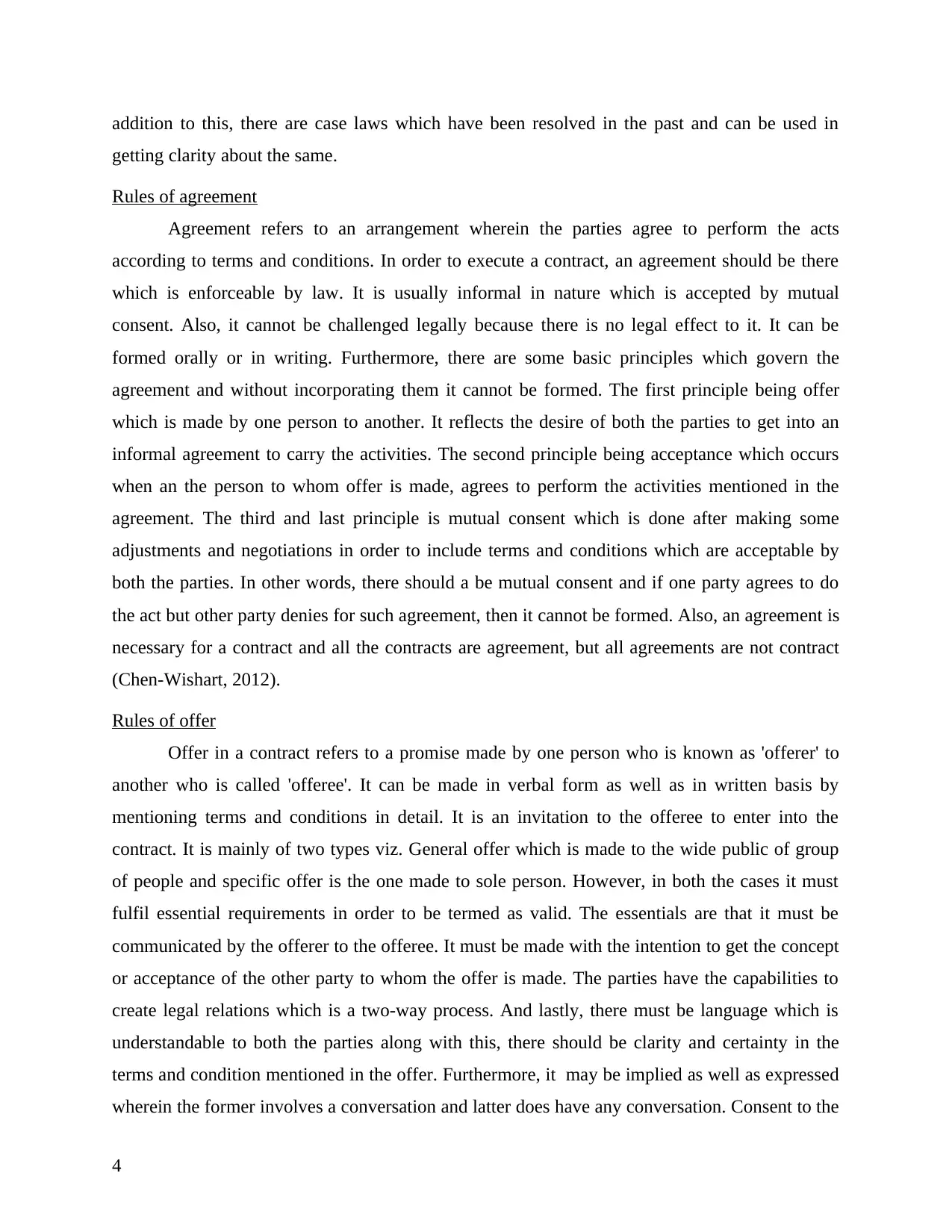
addition to this, there are case laws which have been resolved in the past and can be used in
getting clarity about the same.
Rules of agreement
Agreement refers to an arrangement wherein the parties agree to perform the acts
according to terms and conditions. In order to execute a contract, an agreement should be there
which is enforceable by law. It is usually informal in nature which is accepted by mutual
consent. Also, it cannot be challenged legally because there is no legal effect to it. It can be
formed orally or in writing. Furthermore, there are some basic principles which govern the
agreement and without incorporating them it cannot be formed. The first principle being offer
which is made by one person to another. It reflects the desire of both the parties to get into an
informal agreement to carry the activities. The second principle being acceptance which occurs
when an the person to whom offer is made, agrees to perform the activities mentioned in the
agreement. The third and last principle is mutual consent which is done after making some
adjustments and negotiations in order to include terms and conditions which are acceptable by
both the parties. In other words, there should a be mutual consent and if one party agrees to do
the act but other party denies for such agreement, then it cannot be formed. Also, an agreement is
necessary for a contract and all the contracts are agreement, but all agreements are not contract
(Chen-Wishart, 2012).
Rules of offer
Offer in a contract refers to a promise made by one person who is known as 'offerer' to
another who is called 'offeree'. It can be made in verbal form as well as in written basis by
mentioning terms and conditions in detail. It is an invitation to the offeree to enter into the
contract. It is mainly of two types viz. General offer which is made to the wide public of group
of people and specific offer is the one made to sole person. However, in both the cases it must
fulfil essential requirements in order to be termed as valid. The essentials are that it must be
communicated by the offerer to the offeree. It must be made with the intention to get the concept
or acceptance of the other party to whom the offer is made. The parties have the capabilities to
create legal relations which is a two-way process. And lastly, there must be language which is
understandable to both the parties along with this, there should be clarity and certainty in the
terms and condition mentioned in the offer. Furthermore, it may be implied as well as expressed
wherein the former involves a conversation and latter does have any conversation. Consent to the
4
getting clarity about the same.
Rules of agreement
Agreement refers to an arrangement wherein the parties agree to perform the acts
according to terms and conditions. In order to execute a contract, an agreement should be there
which is enforceable by law. It is usually informal in nature which is accepted by mutual
consent. Also, it cannot be challenged legally because there is no legal effect to it. It can be
formed orally or in writing. Furthermore, there are some basic principles which govern the
agreement and without incorporating them it cannot be formed. The first principle being offer
which is made by one person to another. It reflects the desire of both the parties to get into an
informal agreement to carry the activities. The second principle being acceptance which occurs
when an the person to whom offer is made, agrees to perform the activities mentioned in the
agreement. The third and last principle is mutual consent which is done after making some
adjustments and negotiations in order to include terms and conditions which are acceptable by
both the parties. In other words, there should a be mutual consent and if one party agrees to do
the act but other party denies for such agreement, then it cannot be formed. Also, an agreement is
necessary for a contract and all the contracts are agreement, but all agreements are not contract
(Chen-Wishart, 2012).
Rules of offer
Offer in a contract refers to a promise made by one person who is known as 'offerer' to
another who is called 'offeree'. It can be made in verbal form as well as in written basis by
mentioning terms and conditions in detail. It is an invitation to the offeree to enter into the
contract. It is mainly of two types viz. General offer which is made to the wide public of group
of people and specific offer is the one made to sole person. However, in both the cases it must
fulfil essential requirements in order to be termed as valid. The essentials are that it must be
communicated by the offerer to the offeree. It must be made with the intention to get the concept
or acceptance of the other party to whom the offer is made. The parties have the capabilities to
create legal relations which is a two-way process. And lastly, there must be language which is
understandable to both the parties along with this, there should be clarity and certainty in the
terms and condition mentioned in the offer. Furthermore, it may be implied as well as expressed
wherein the former involves a conversation and latter does have any conversation. Consent to the
4
Paraphrase This Document
Need a fresh take? Get an instant paraphrase of this document with our AI Paraphraser
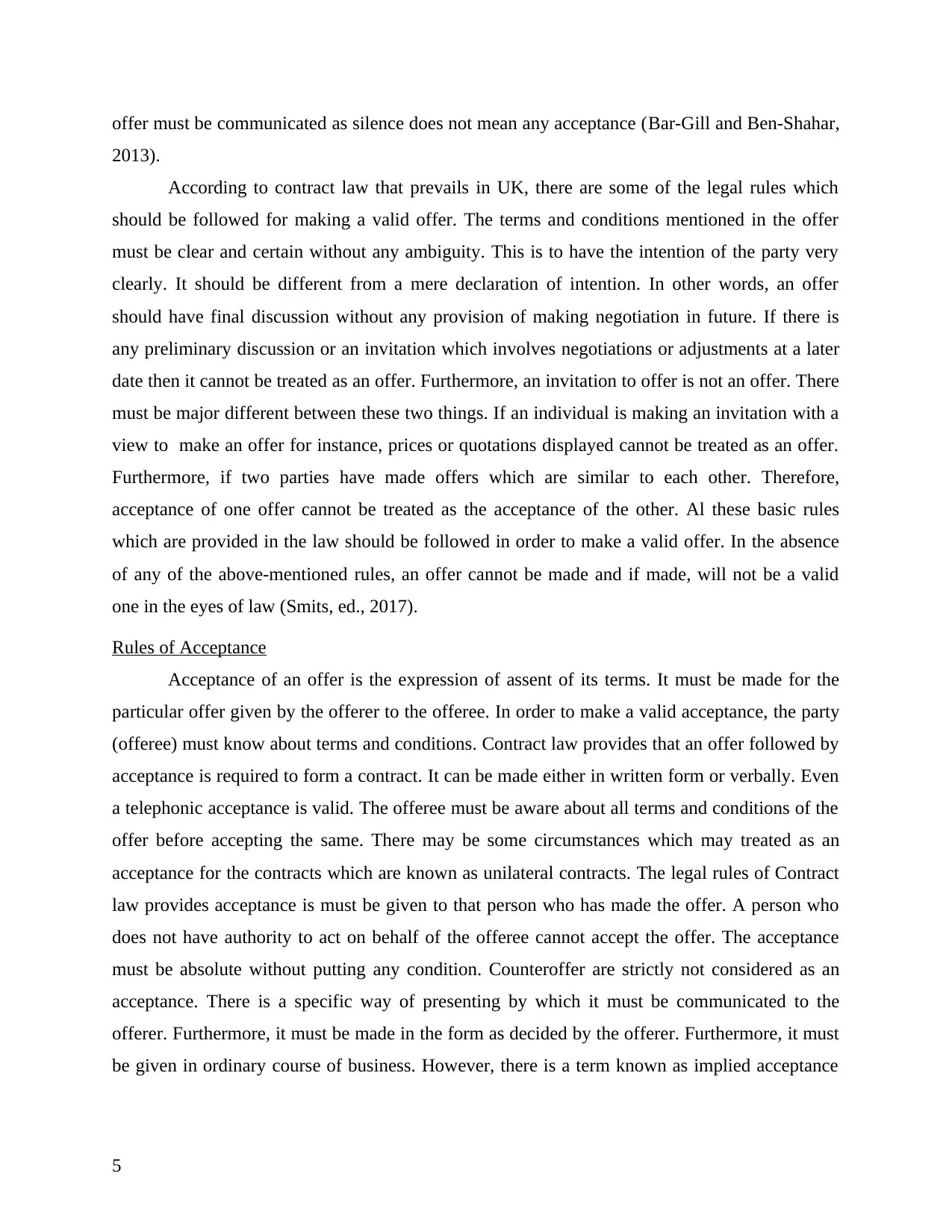
offer must be communicated as silence does not mean any acceptance (Bar-Gill and Ben-Shahar,
2013).
According to contract law that prevails in UK, there are some of the legal rules which
should be followed for making a valid offer. The terms and conditions mentioned in the offer
must be clear and certain without any ambiguity. This is to have the intention of the party very
clearly. It should be different from a mere declaration of intention. In other words, an offer
should have final discussion without any provision of making negotiation in future. If there is
any preliminary discussion or an invitation which involves negotiations or adjustments at a later
date then it cannot be treated as an offer. Furthermore, an invitation to offer is not an offer. There
must be major different between these two things. If an individual is making an invitation with a
view to make an offer for instance, prices or quotations displayed cannot be treated as an offer.
Furthermore, if two parties have made offers which are similar to each other. Therefore,
acceptance of one offer cannot be treated as the acceptance of the other. Al these basic rules
which are provided in the law should be followed in order to make a valid offer. In the absence
of any of the above-mentioned rules, an offer cannot be made and if made, will not be a valid
one in the eyes of law (Smits, ed., 2017).
Rules of Acceptance
Acceptance of an offer is the expression of assent of its terms. It must be made for the
particular offer given by the offerer to the offeree. In order to make a valid acceptance, the party
(offeree) must know about terms and conditions. Contract law provides that an offer followed by
acceptance is required to form a contract. It can be made either in written form or verbally. Even
a telephonic acceptance is valid. The offeree must be aware about all terms and conditions of the
offer before accepting the same. There may be some circumstances which may treated as an
acceptance for the contracts which are known as unilateral contracts. The legal rules of Contract
law provides acceptance is must be given to that person who has made the offer. A person who
does not have authority to act on behalf of the offeree cannot accept the offer. The acceptance
must be absolute without putting any condition. Counteroffer are strictly not considered as an
acceptance. There is a specific way of presenting by which it must be communicated to the
offerer. Furthermore, it must be made in the form as decided by the offerer. Furthermore, it must
be given in ordinary course of business. However, there is a term known as implied acceptance
5
2013).
According to contract law that prevails in UK, there are some of the legal rules which
should be followed for making a valid offer. The terms and conditions mentioned in the offer
must be clear and certain without any ambiguity. This is to have the intention of the party very
clearly. It should be different from a mere declaration of intention. In other words, an offer
should have final discussion without any provision of making negotiation in future. If there is
any preliminary discussion or an invitation which involves negotiations or adjustments at a later
date then it cannot be treated as an offer. Furthermore, an invitation to offer is not an offer. There
must be major different between these two things. If an individual is making an invitation with a
view to make an offer for instance, prices or quotations displayed cannot be treated as an offer.
Furthermore, if two parties have made offers which are similar to each other. Therefore,
acceptance of one offer cannot be treated as the acceptance of the other. Al these basic rules
which are provided in the law should be followed in order to make a valid offer. In the absence
of any of the above-mentioned rules, an offer cannot be made and if made, will not be a valid
one in the eyes of law (Smits, ed., 2017).
Rules of Acceptance
Acceptance of an offer is the expression of assent of its terms. It must be made for the
particular offer given by the offerer to the offeree. In order to make a valid acceptance, the party
(offeree) must know about terms and conditions. Contract law provides that an offer followed by
acceptance is required to form a contract. It can be made either in written form or verbally. Even
a telephonic acceptance is valid. The offeree must be aware about all terms and conditions of the
offer before accepting the same. There may be some circumstances which may treated as an
acceptance for the contracts which are known as unilateral contracts. The legal rules of Contract
law provides acceptance is must be given to that person who has made the offer. A person who
does not have authority to act on behalf of the offeree cannot accept the offer. The acceptance
must be absolute without putting any condition. Counteroffer are strictly not considered as an
acceptance. There is a specific way of presenting by which it must be communicated to the
offerer. Furthermore, it must be made in the form as decided by the offerer. Furthermore, it must
be given in ordinary course of business. However, there is a term known as implied acceptance
5
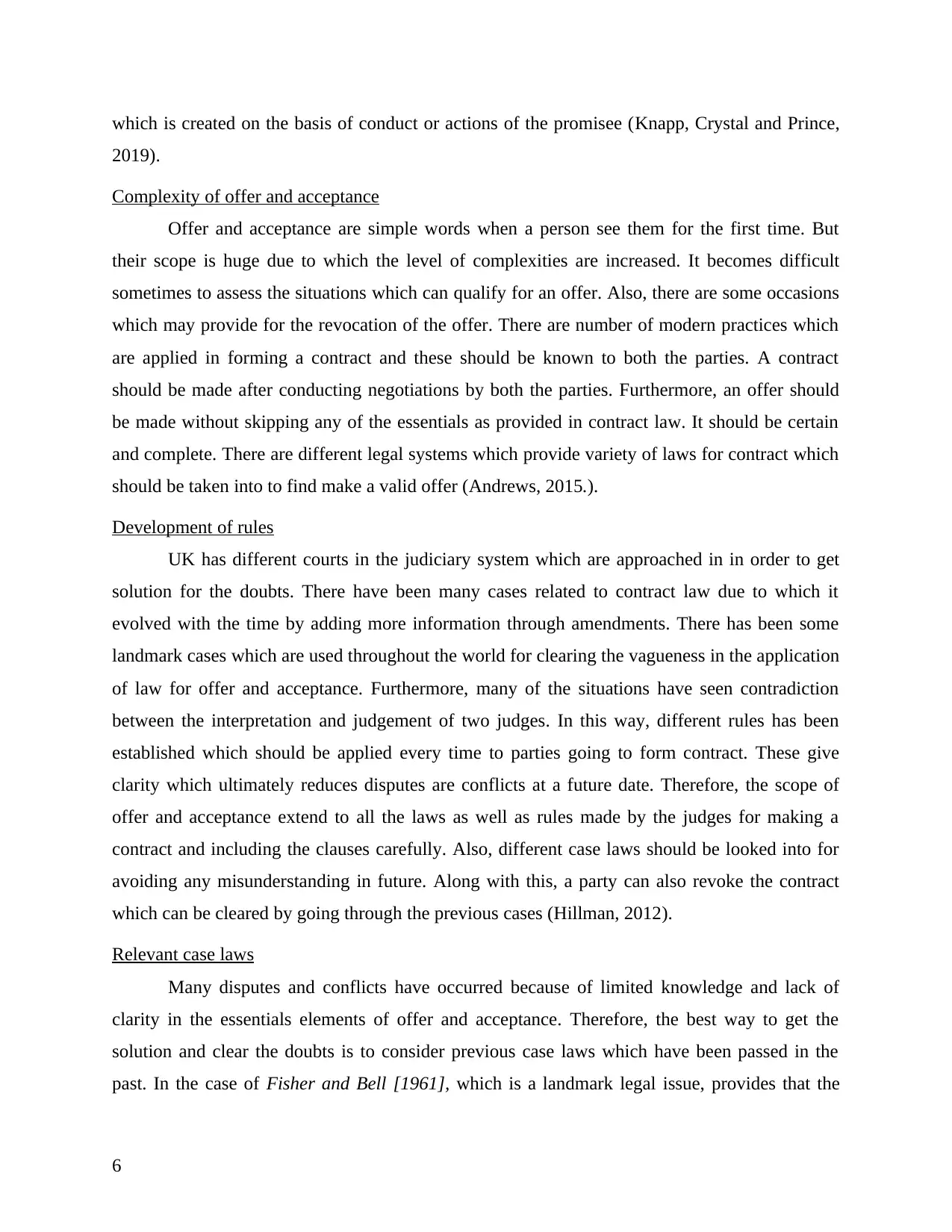
which is created on the basis of conduct or actions of the promisee (Knapp, Crystal and Prince,
2019).
Complexity of offer and acceptance
Offer and acceptance are simple words when a person see them for the first time. But
their scope is huge due to which the level of complexities are increased. It becomes difficult
sometimes to assess the situations which can qualify for an offer. Also, there are some occasions
which may provide for the revocation of the offer. There are number of modern practices which
are applied in forming a contract and these should be known to both the parties. A contract
should be made after conducting negotiations by both the parties. Furthermore, an offer should
be made without skipping any of the essentials as provided in contract law. It should be certain
and complete. There are different legal systems which provide variety of laws for contract which
should be taken into to find make a valid offer (Andrews, 2015.).
Development of rules
UK has different courts in the judiciary system which are approached in in order to get
solution for the doubts. There have been many cases related to contract law due to which it
evolved with the time by adding more information through amendments. There has been some
landmark cases which are used throughout the world for clearing the vagueness in the application
of law for offer and acceptance. Furthermore, many of the situations have seen contradiction
between the interpretation and judgement of two judges. In this way, different rules has been
established which should be applied every time to parties going to form contract. These give
clarity which ultimately reduces disputes are conflicts at a future date. Therefore, the scope of
offer and acceptance extend to all the laws as well as rules made by the judges for making a
contract and including the clauses carefully. Also, different case laws should be looked into for
avoiding any misunderstanding in future. Along with this, a party can also revoke the contract
which can be cleared by going through the previous cases (Hillman, 2012).
Relevant case laws
Many disputes and conflicts have occurred because of limited knowledge and lack of
clarity in the essentials elements of offer and acceptance. Therefore, the best way to get the
solution and clear the doubts is to consider previous case laws which have been passed in the
past. In the case of Fisher and Bell [1961], which is a landmark legal issue, provides that the
6
2019).
Complexity of offer and acceptance
Offer and acceptance are simple words when a person see them for the first time. But
their scope is huge due to which the level of complexities are increased. It becomes difficult
sometimes to assess the situations which can qualify for an offer. Also, there are some occasions
which may provide for the revocation of the offer. There are number of modern practices which
are applied in forming a contract and these should be known to both the parties. A contract
should be made after conducting negotiations by both the parties. Furthermore, an offer should
be made without skipping any of the essentials as provided in contract law. It should be certain
and complete. There are different legal systems which provide variety of laws for contract which
should be taken into to find make a valid offer (Andrews, 2015.).
Development of rules
UK has different courts in the judiciary system which are approached in in order to get
solution for the doubts. There have been many cases related to contract law due to which it
evolved with the time by adding more information through amendments. There has been some
landmark cases which are used throughout the world for clearing the vagueness in the application
of law for offer and acceptance. Furthermore, many of the situations have seen contradiction
between the interpretation and judgement of two judges. In this way, different rules has been
established which should be applied every time to parties going to form contract. These give
clarity which ultimately reduces disputes are conflicts at a future date. Therefore, the scope of
offer and acceptance extend to all the laws as well as rules made by the judges for making a
contract and including the clauses carefully. Also, different case laws should be looked into for
avoiding any misunderstanding in future. Along with this, a party can also revoke the contract
which can be cleared by going through the previous cases (Hillman, 2012).
Relevant case laws
Many disputes and conflicts have occurred because of limited knowledge and lack of
clarity in the essentials elements of offer and acceptance. Therefore, the best way to get the
solution and clear the doubts is to consider previous case laws which have been passed in the
past. In the case of Fisher and Bell [1961], which is a landmark legal issue, provides that the
6
⊘ This is a preview!⊘
Do you want full access?
Subscribe today to unlock all pages.

Trusted by 1+ million students worldwide
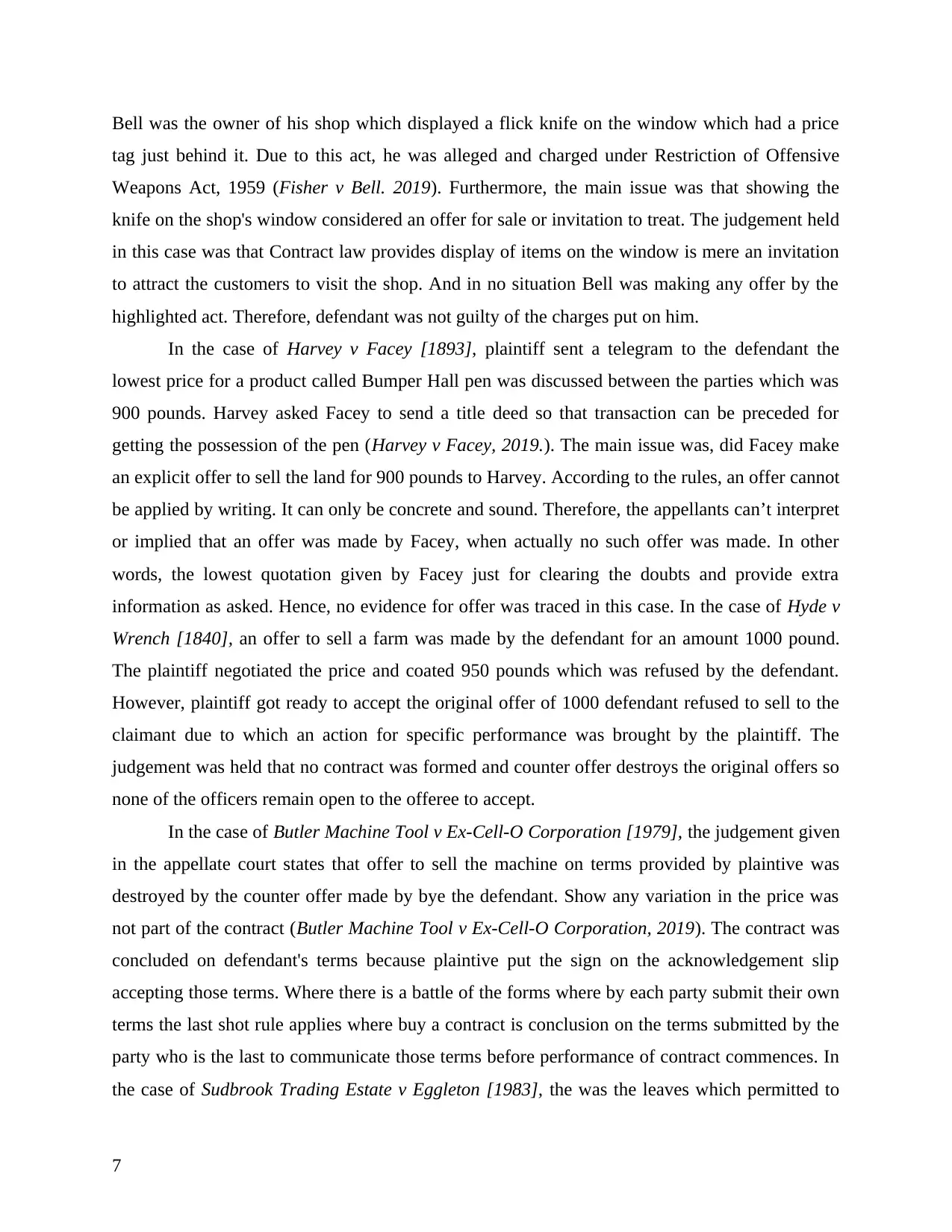
Bell was the owner of his shop which displayed a flick knife on the window which had a price
tag just behind it. Due to this act, he was alleged and charged under Restriction of Offensive
Weapons Act, 1959 (Fisher v Bell. 2019). Furthermore, the main issue was that showing the
knife on the shop's window considered an offer for sale or invitation to treat. The judgement held
in this case was that Contract law provides display of items on the window is mere an invitation
to attract the customers to visit the shop. And in no situation Bell was making any offer by the
highlighted act. Therefore, defendant was not guilty of the charges put on him.
In the case of Harvey v Facey [1893], plaintiff sent a telegram to the defendant the
lowest price for a product called Bumper Hall pen was discussed between the parties which was
900 pounds. Harvey asked Facey to send a title deed so that transaction can be preceded for
getting the possession of the pen (Harvey v Facey, 2019.). The main issue was, did Facey make
an explicit offer to sell the land for 900 pounds to Harvey. According to the rules, an offer cannot
be applied by writing. It can only be concrete and sound. Therefore, the appellants can’t interpret
or implied that an offer was made by Facey, when actually no such offer was made. In other
words, the lowest quotation given by Facey just for clearing the doubts and provide extra
information as asked. Hence, no evidence for offer was traced in this case. In the case of Hyde v
Wrench [1840], an offer to sell a farm was made by the defendant for an amount 1000 pound.
The plaintiff negotiated the price and coated 950 pounds which was refused by the defendant.
However, plaintiff got ready to accept the original offer of 1000 defendant refused to sell to the
claimant due to which an action for specific performance was brought by the plaintiff. The
judgement was held that no contract was formed and counter offer destroys the original offers so
none of the officers remain open to the offeree to accept.
In the case of Butler Machine Tool v Ex-Cell-O Corporation [1979], the judgement given
in the appellate court states that offer to sell the machine on terms provided by plaintive was
destroyed by the counter offer made by bye the defendant. Show any variation in the price was
not part of the contract (Butler Machine Tool v Ex-Cell-O Corporation, 2019). The contract was
concluded on defendant's terms because plaintive put the sign on the acknowledgement slip
accepting those terms. Where there is a battle of the forms where by each party submit their own
terms the last shot rule applies where buy a contract is conclusion on the terms submitted by the
party who is the last to communicate those terms before performance of contract commences. In
the case of Sudbrook Trading Estate v Eggleton [1983], the was the leaves which permitted to
7
tag just behind it. Due to this act, he was alleged and charged under Restriction of Offensive
Weapons Act, 1959 (Fisher v Bell. 2019). Furthermore, the main issue was that showing the
knife on the shop's window considered an offer for sale or invitation to treat. The judgement held
in this case was that Contract law provides display of items on the window is mere an invitation
to attract the customers to visit the shop. And in no situation Bell was making any offer by the
highlighted act. Therefore, defendant was not guilty of the charges put on him.
In the case of Harvey v Facey [1893], plaintiff sent a telegram to the defendant the
lowest price for a product called Bumper Hall pen was discussed between the parties which was
900 pounds. Harvey asked Facey to send a title deed so that transaction can be preceded for
getting the possession of the pen (Harvey v Facey, 2019.). The main issue was, did Facey make
an explicit offer to sell the land for 900 pounds to Harvey. According to the rules, an offer cannot
be applied by writing. It can only be concrete and sound. Therefore, the appellants can’t interpret
or implied that an offer was made by Facey, when actually no such offer was made. In other
words, the lowest quotation given by Facey just for clearing the doubts and provide extra
information as asked. Hence, no evidence for offer was traced in this case. In the case of Hyde v
Wrench [1840], an offer to sell a farm was made by the defendant for an amount 1000 pound.
The plaintiff negotiated the price and coated 950 pounds which was refused by the defendant.
However, plaintiff got ready to accept the original offer of 1000 defendant refused to sell to the
claimant due to which an action for specific performance was brought by the plaintiff. The
judgement was held that no contract was formed and counter offer destroys the original offers so
none of the officers remain open to the offeree to accept.
In the case of Butler Machine Tool v Ex-Cell-O Corporation [1979], the judgement given
in the appellate court states that offer to sell the machine on terms provided by plaintive was
destroyed by the counter offer made by bye the defendant. Show any variation in the price was
not part of the contract (Butler Machine Tool v Ex-Cell-O Corporation, 2019). The contract was
concluded on defendant's terms because plaintive put the sign on the acknowledgement slip
accepting those terms. Where there is a battle of the forms where by each party submit their own
terms the last shot rule applies where buy a contract is conclusion on the terms submitted by the
party who is the last to communicate those terms before performance of contract commences. In
the case of Sudbrook Trading Estate v Eggleton [1983], the was the leaves which permitted to
7
Paraphrase This Document
Need a fresh take? Get an instant paraphrase of this document with our AI Paraphraser
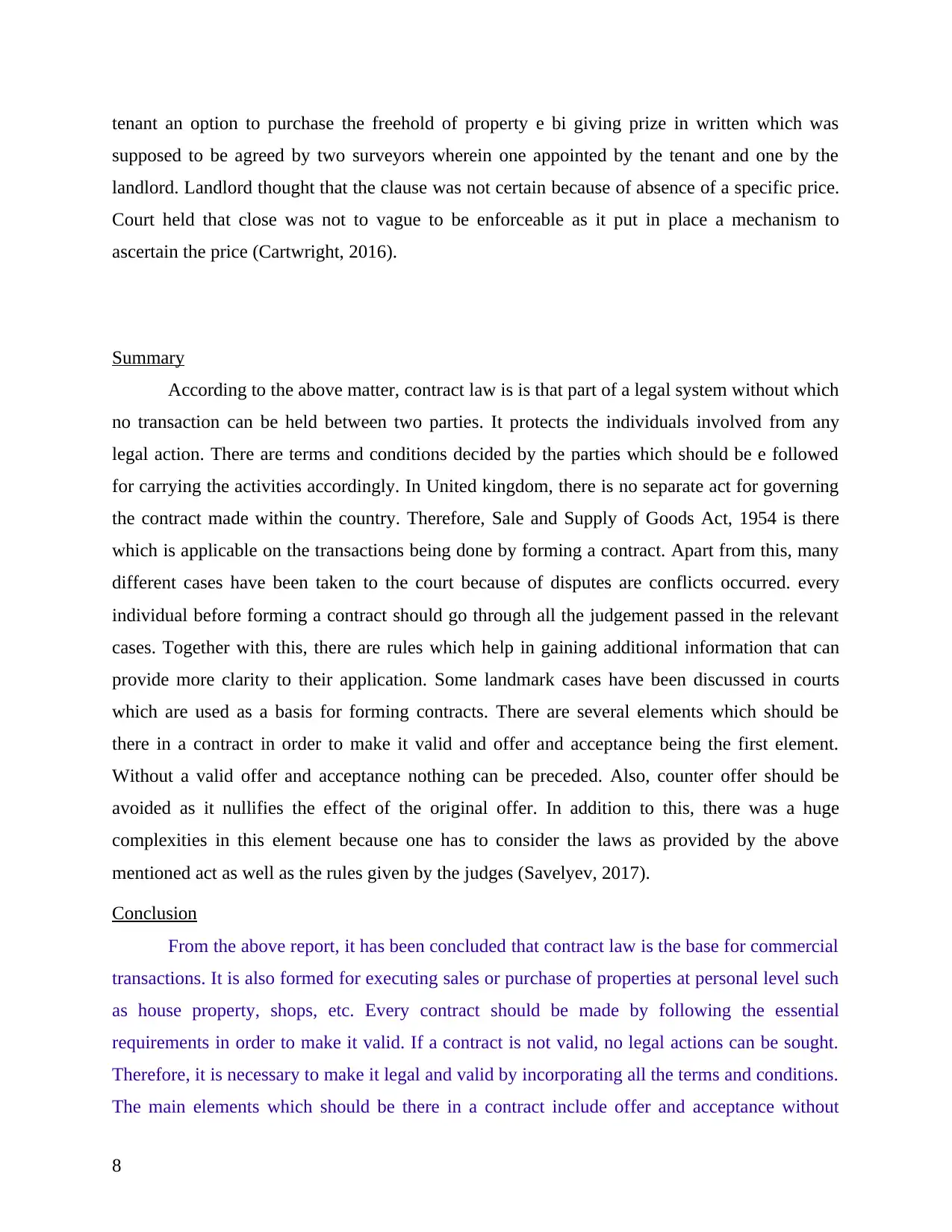
tenant an option to purchase the freehold of property e bi giving prize in written which was
supposed to be agreed by two surveyors wherein one appointed by the tenant and one by the
landlord. Landlord thought that the clause was not certain because of absence of a specific price.
Court held that close was not to vague to be enforceable as it put in place a mechanism to
ascertain the price (Cartwright, 2016).
Summary
According to the above matter, contract law is is that part of a legal system without which
no transaction can be held between two parties. It protects the individuals involved from any
legal action. There are terms and conditions decided by the parties which should be e followed
for carrying the activities accordingly. In United kingdom, there is no separate act for governing
the contract made within the country. Therefore, Sale and Supply of Goods Act, 1954 is there
which is applicable on the transactions being done by forming a contract. Apart from this, many
different cases have been taken to the court because of disputes are conflicts occurred. every
individual before forming a contract should go through all the judgement passed in the relevant
cases. Together with this, there are rules which help in gaining additional information that can
provide more clarity to their application. Some landmark cases have been discussed in courts
which are used as a basis for forming contracts. There are several elements which should be
there in a contract in order to make it valid and offer and acceptance being the first element.
Without a valid offer and acceptance nothing can be preceded. Also, counter offer should be
avoided as it nullifies the effect of the original offer. In addition to this, there was a huge
complexities in this element because one has to consider the laws as provided by the above
mentioned act as well as the rules given by the judges (Savelyev, 2017).
Conclusion
From the above report, it has been concluded that contract law is the base for commercial
transactions. It is also formed for executing sales or purchase of properties at personal level such
as house property, shops, etc. Every contract should be made by following the essential
requirements in order to make it valid. If a contract is not valid, no legal actions can be sought.
Therefore, it is necessary to make it legal and valid by incorporating all the terms and conditions.
The main elements which should be there in a contract include offer and acceptance without
8
supposed to be agreed by two surveyors wherein one appointed by the tenant and one by the
landlord. Landlord thought that the clause was not certain because of absence of a specific price.
Court held that close was not to vague to be enforceable as it put in place a mechanism to
ascertain the price (Cartwright, 2016).
Summary
According to the above matter, contract law is is that part of a legal system without which
no transaction can be held between two parties. It protects the individuals involved from any
legal action. There are terms and conditions decided by the parties which should be e followed
for carrying the activities accordingly. In United kingdom, there is no separate act for governing
the contract made within the country. Therefore, Sale and Supply of Goods Act, 1954 is there
which is applicable on the transactions being done by forming a contract. Apart from this, many
different cases have been taken to the court because of disputes are conflicts occurred. every
individual before forming a contract should go through all the judgement passed in the relevant
cases. Together with this, there are rules which help in gaining additional information that can
provide more clarity to their application. Some landmark cases have been discussed in courts
which are used as a basis for forming contracts. There are several elements which should be
there in a contract in order to make it valid and offer and acceptance being the first element.
Without a valid offer and acceptance nothing can be preceded. Also, counter offer should be
avoided as it nullifies the effect of the original offer. In addition to this, there was a huge
complexities in this element because one has to consider the laws as provided by the above
mentioned act as well as the rules given by the judges (Savelyev, 2017).
Conclusion
From the above report, it has been concluded that contract law is the base for commercial
transactions. It is also formed for executing sales or purchase of properties at personal level such
as house property, shops, etc. Every contract should be made by following the essential
requirements in order to make it valid. If a contract is not valid, no legal actions can be sought.
Therefore, it is necessary to make it legal and valid by incorporating all the terms and conditions.
The main elements which should be there in a contract include offer and acceptance without
8
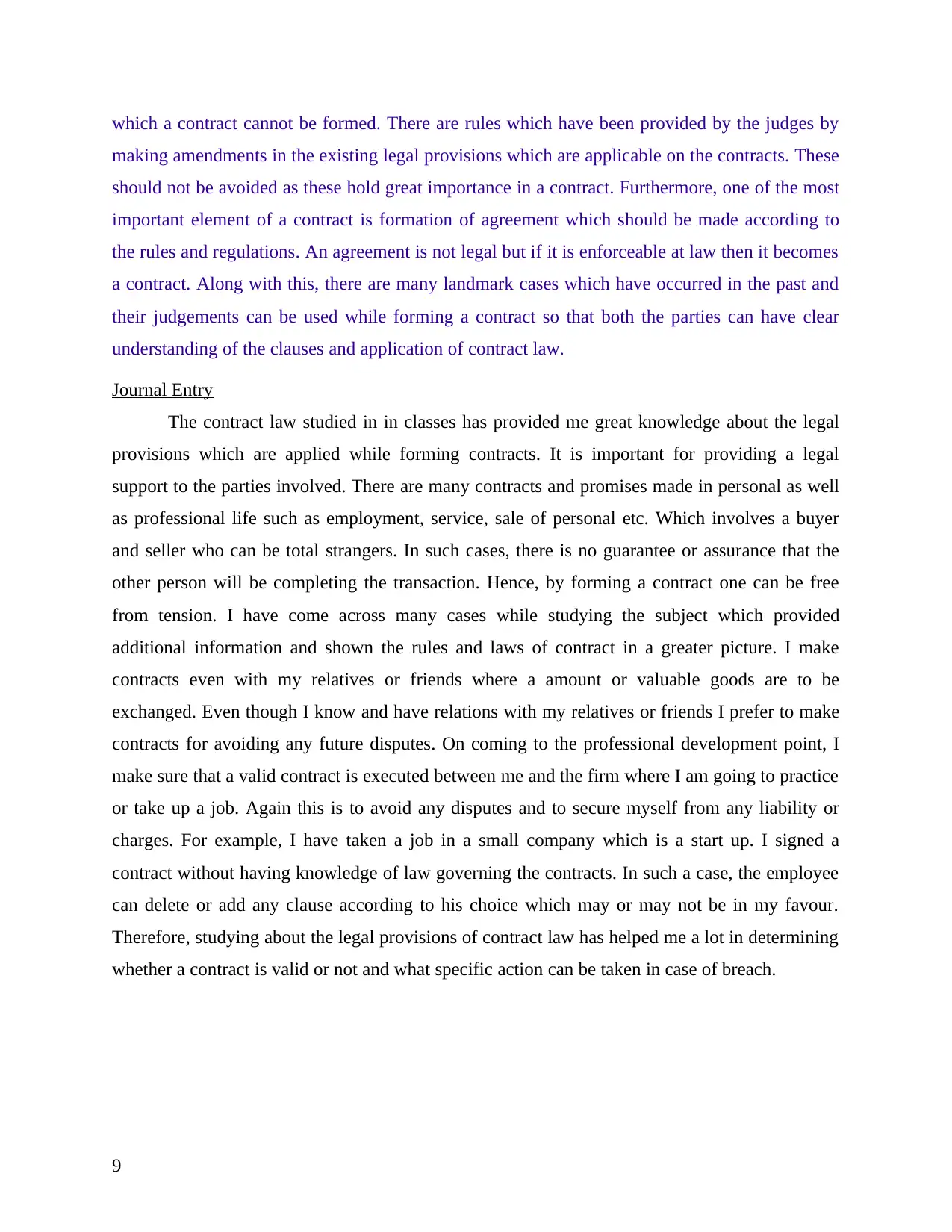
which a contract cannot be formed. There are rules which have been provided by the judges by
making amendments in the existing legal provisions which are applicable on the contracts. These
should not be avoided as these hold great importance in a contract. Furthermore, one of the most
important element of a contract is formation of agreement which should be made according to
the rules and regulations. An agreement is not legal but if it is enforceable at law then it becomes
a contract. Along with this, there are many landmark cases which have occurred in the past and
their judgements can be used while forming a contract so that both the parties can have clear
understanding of the clauses and application of contract law.
Journal Entry
The contract law studied in in classes has provided me great knowledge about the legal
provisions which are applied while forming contracts. It is important for providing a legal
support to the parties involved. There are many contracts and promises made in personal as well
as professional life such as employment, service, sale of personal etc. Which involves a buyer
and seller who can be total strangers. In such cases, there is no guarantee or assurance that the
other person will be completing the transaction. Hence, by forming a contract one can be free
from tension. I have come across many cases while studying the subject which provided
additional information and shown the rules and laws of contract in a greater picture. I make
contracts even with my relatives or friends where a amount or valuable goods are to be
exchanged. Even though I know and have relations with my relatives or friends I prefer to make
contracts for avoiding any future disputes. On coming to the professional development point, I
make sure that a valid contract is executed between me and the firm where I am going to practice
or take up a job. Again this is to avoid any disputes and to secure myself from any liability or
charges. For example, I have taken a job in a small company which is a start up. I signed a
contract without having knowledge of law governing the contracts. In such a case, the employee
can delete or add any clause according to his choice which may or may not be in my favour.
Therefore, studying about the legal provisions of contract law has helped me a lot in determining
whether a contract is valid or not and what specific action can be taken in case of breach.
9
making amendments in the existing legal provisions which are applicable on the contracts. These
should not be avoided as these hold great importance in a contract. Furthermore, one of the most
important element of a contract is formation of agreement which should be made according to
the rules and regulations. An agreement is not legal but if it is enforceable at law then it becomes
a contract. Along with this, there are many landmark cases which have occurred in the past and
their judgements can be used while forming a contract so that both the parties can have clear
understanding of the clauses and application of contract law.
Journal Entry
The contract law studied in in classes has provided me great knowledge about the legal
provisions which are applied while forming contracts. It is important for providing a legal
support to the parties involved. There are many contracts and promises made in personal as well
as professional life such as employment, service, sale of personal etc. Which involves a buyer
and seller who can be total strangers. In such cases, there is no guarantee or assurance that the
other person will be completing the transaction. Hence, by forming a contract one can be free
from tension. I have come across many cases while studying the subject which provided
additional information and shown the rules and laws of contract in a greater picture. I make
contracts even with my relatives or friends where a amount or valuable goods are to be
exchanged. Even though I know and have relations with my relatives or friends I prefer to make
contracts for avoiding any future disputes. On coming to the professional development point, I
make sure that a valid contract is executed between me and the firm where I am going to practice
or take up a job. Again this is to avoid any disputes and to secure myself from any liability or
charges. For example, I have taken a job in a small company which is a start up. I signed a
contract without having knowledge of law governing the contracts. In such a case, the employee
can delete or add any clause according to his choice which may or may not be in my favour.
Therefore, studying about the legal provisions of contract law has helped me a lot in determining
whether a contract is valid or not and what specific action can be taken in case of breach.
9
⊘ This is a preview!⊘
Do you want full access?
Subscribe today to unlock all pages.

Trusted by 1+ million students worldwide
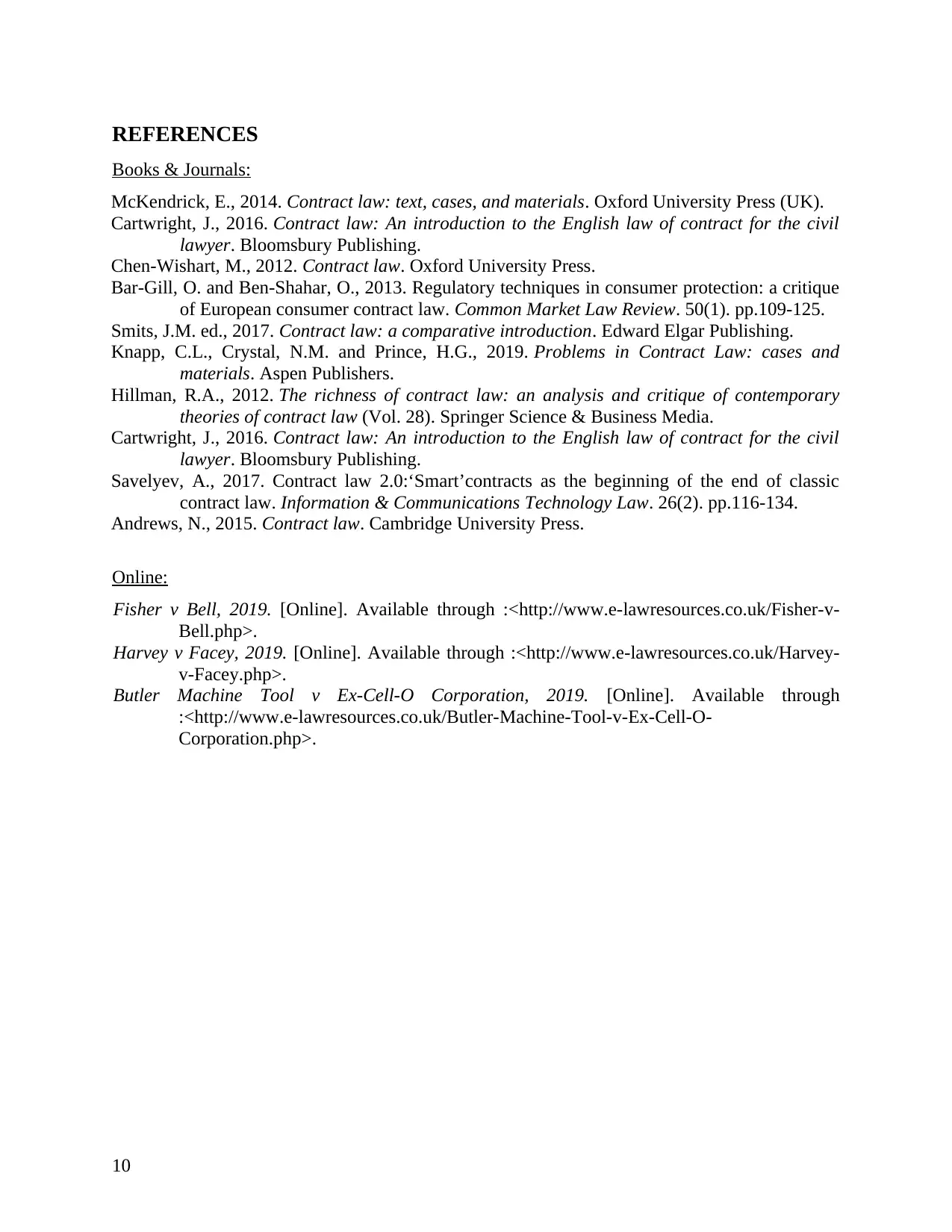
REFERENCES
Books & Journals:
McKendrick, E., 2014. Contract law: text, cases, and materials. Oxford University Press (UK).
Cartwright, J., 2016. Contract law: An introduction to the English law of contract for the civil
lawyer. Bloomsbury Publishing.
Chen-Wishart, M., 2012. Contract law. Oxford University Press.
Bar-Gill, O. and Ben-Shahar, O., 2013. Regulatory techniques in consumer protection: a critique
of European consumer contract law. Common Market Law Review. 50(1). pp.109-125.
Smits, J.M. ed., 2017. Contract law: a comparative introduction. Edward Elgar Publishing.
Knapp, C.L., Crystal, N.M. and Prince, H.G., 2019. Problems in Contract Law: cases and
materials. Aspen Publishers.
Hillman, R.A., 2012. The richness of contract law: an analysis and critique of contemporary
theories of contract law (Vol. 28). Springer Science & Business Media.
Cartwright, J., 2016. Contract law: An introduction to the English law of contract for the civil
lawyer. Bloomsbury Publishing.
Savelyev, A., 2017. Contract law 2.0:‘Smart’contracts as the beginning of the end of classic
contract law. Information & Communications Technology Law. 26(2). pp.116-134.
Andrews, N., 2015. Contract law. Cambridge University Press.
Online:
Fisher v Bell, 2019. [Online]. Available through :<http://www.e-lawresources.co.uk/Fisher-v-
Bell.php>.
Harvey v Facey, 2019. [Online]. Available through :<http://www.e-lawresources.co.uk/Harvey-
v-Facey.php>.
Butler Machine Tool v Ex-Cell-O Corporation, 2019. [Online]. Available through
:<http://www.e-lawresources.co.uk/Butler-Machine-Tool-v-Ex-Cell-O-
Corporation.php>.
10
Books & Journals:
McKendrick, E., 2014. Contract law: text, cases, and materials. Oxford University Press (UK).
Cartwright, J., 2016. Contract law: An introduction to the English law of contract for the civil
lawyer. Bloomsbury Publishing.
Chen-Wishart, M., 2012. Contract law. Oxford University Press.
Bar-Gill, O. and Ben-Shahar, O., 2013. Regulatory techniques in consumer protection: a critique
of European consumer contract law. Common Market Law Review. 50(1). pp.109-125.
Smits, J.M. ed., 2017. Contract law: a comparative introduction. Edward Elgar Publishing.
Knapp, C.L., Crystal, N.M. and Prince, H.G., 2019. Problems in Contract Law: cases and
materials. Aspen Publishers.
Hillman, R.A., 2012. The richness of contract law: an analysis and critique of contemporary
theories of contract law (Vol. 28). Springer Science & Business Media.
Cartwright, J., 2016. Contract law: An introduction to the English law of contract for the civil
lawyer. Bloomsbury Publishing.
Savelyev, A., 2017. Contract law 2.0:‘Smart’contracts as the beginning of the end of classic
contract law. Information & Communications Technology Law. 26(2). pp.116-134.
Andrews, N., 2015. Contract law. Cambridge University Press.
Online:
Fisher v Bell, 2019. [Online]. Available through :<http://www.e-lawresources.co.uk/Fisher-v-
Bell.php>.
Harvey v Facey, 2019. [Online]. Available through :<http://www.e-lawresources.co.uk/Harvey-
v-Facey.php>.
Butler Machine Tool v Ex-Cell-O Corporation, 2019. [Online]. Available through
:<http://www.e-lawresources.co.uk/Butler-Machine-Tool-v-Ex-Cell-O-
Corporation.php>.
10
Paraphrase This Document
Need a fresh take? Get an instant paraphrase of this document with our AI Paraphraser

11
1 out of 11
Related Documents
Your All-in-One AI-Powered Toolkit for Academic Success.
+13062052269
info@desklib.com
Available 24*7 on WhatsApp / Email
![[object Object]](/_next/static/media/star-bottom.7253800d.svg)
Unlock your academic potential
Copyright © 2020–2026 A2Z Services. All Rights Reserved. Developed and managed by ZUCOL.





